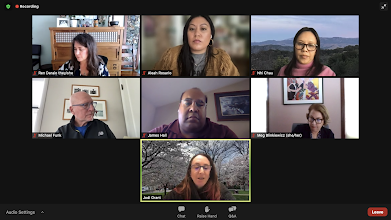Afterschool programs were greatly affected by the COVID-19 pandemic. This included program closures, a youth worker shortage and a drop in attendance. We wanted to learn more about the impacts on professional development and future needs looking forward. To this end, we conducted a survey of 43 afterschool program leaders inquiring about the future of professional development. Below we offer a report on what we learned. (This report is also available as a PDF here).
ROLES OF RESPONDENTS:
- Afterschool Program Director (Single Site): 31%
- Multiple Afterschool Sites Coordinator (This could be a school district or a regional coordinator): 29%
- Afterschool Consultant (This could be a school district or private consultant focused on program quality, student support, coach and staff development, etc): 19%
- Afterschool Program Staff: 10%
- Non-profit Program Provider Executive Director: 7%
- Other: 5%
WHAT STATES DO RESPONDENTS WORK IN:
- California: 72%
- Florida: 12%
- Ohio: 7%
- Texas: 3%
- Missouri: 3%
- Washington: 3%
- New York: 3%
DO PROGRAM LEADERS PREFER FACE-TO-FACE, VIRTUAL OR A HYBRID MODEL FOR TRAININGS?
DUE TO THE MANY POSITIONS THAT NEED TO BE FILLED BY THE FALL, IS THERE A STRONG NEED FOR AFTERSCHOOL "BASICS" TRAINING (INTRO TO YOUTH DEVELOPMENT, BEHAVIOR MANAGEMENT AND MENTAL HEALTH, PROGRAM QUALITY, ETC.), AS THEY ONBOARD A NUMBER OF NEW STAFF?
- Yes: 100%
IS YOUR BUDGET FOR PROFESSIONAL DEVELOPMENT LARGER OR SMALLER THIS YEAR THAN BEFORE THE PANDEMIC?
ARE YOU ABLE TO PAY YOUR STAFF FOR PROFESSIONAL DEVELOPMENT TIME?
HOW MANY NEW HIRES WILL YOU TRY TO RECRUIT FOR THE NEXT SCHOOL YEAR?
ARE THERE FUTURE TRAINING TOPICS THAT PROGRAMS ARE PARTICULARLY INTERESTED IN?
- Managing Behavior: (9)
- SEL: (9)
- Trauma Informed Practices: (7)
- Student Mental Health: (5)
- How To Re-Engage Students: (5)
- Classroom Management: (4)
- Engaging Activity Planning: (3)
- Child/Youth Development: (2)
- De-Escalation: (2)
- The Pandemic Shutdown and Effects on Mental Health
- Self-Care
- Mental Health for Staff
- Youth Engagement in The Post Pandemic Era
- Children Growing Up Without a Parent












No comments:
Post a Comment